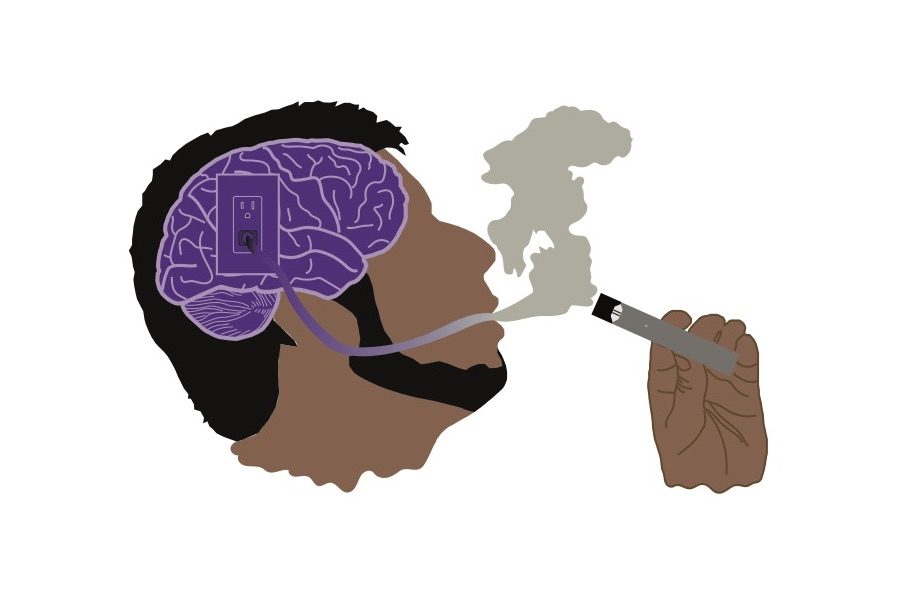JUULing: The Consequence
new age restriction aims to reduce teen harm
Westside is looking to enforce the new law, punishing students under the age of 19 that are found with a nicotine device.
Three million students around the U.S. are reported to regularly be using e-cigarette and vape products. According to a 2018 National Youth Tobacco Use Survey, about 12% of high school students and 3% of middle school students are regular users of vaping devices. Food and Drug Administrator Scott Gottlieb has declared teen vaping an epidemic. More and more teens are starting to use vapes.
Latasha Thompson, who is a nurse at Catholic Health Initiatives in Omaha, who specializes in teen health, says vaping is not much safer than smoking.
“There hasn’t been any exact clinical research to show vaping is necessarily as dangerous as cigarettes,” Thompson said. “I believe that vape companies claim vaping is safer than cigarettes as an advertising scheme to appeal to the younger generation.”
According to Truth Initiative, which is a campaign to end teen and young adult tobacco use, there are three main reasons teens start vaping. The most common is the belief that vape devices are safer than traditional cigarettes. They also are appealed to the flavors, like chocolate or cotton candy. Some also have started vaping regularly because a friend pressured them to.
Thompson has worked with teens who’ve regularly vaped. She has seen the dangers of vaping short term and long term.
“Short term you see dry mouth, get a cough, and sometimes dehydration,” Thompson said. “Long term you typically see respiratory stress and that can later lead to asthma”.
According to The Washington Post, The American Heart Association, American Cancer Society and American Lung Association, sued the FDA, challenging the FDA’s decision to let certain flavors such as gummy bear and cotton candy to remain on the market that appeal to children.
“[Vaping] actually kills your brain cells,” Thompson said. “It’s poison for your brain. Later in life vaping can cause dementia, memory loss, and stroke. Vaping causes your brain cells to contract. It’s no good”.
Thompson is very passionate when trying to stop teens from using vapes.
“They’re definitely not doing enough,” Thompson said. “Personally I think to solve it, they need to take it off the market”.
Zulma Yunt, a pulmonologist at National Jewish Health in Denver, says that teen and adults both have very different motivations for using vapes.
“Adults typically use vapes to try to reduce or quit smoking,” Yunt said. “Teens have not been former smokers, and they use vape devices recreationally.”
Yunt has seen and dealt with many people with bad lungs due to vaping.
“The lung tissues absorb the vape juice molecules and puts in the bloodstream,” Yunt said. “The ingredients in vape juice makes you addicted, is bad for your heart, and can give you asthma for the rest of your life.”
Thompson and Yunt state that vaping is terrible for teens and for their health. However, a senior at Westside High School, who requested to remain anonymous, said vaping hasn’t affected him at all.
“I don’t see the big deal about vaping,” he said. “It’s not as bad as cigarettes.”
He is 18, meaning in the state of Nebraska, he is legally allowed to purchase tobacco from commercial stores. According to Tobacco Free Kids, only six states have raised the legal age to 21 for purchasing tobacco products.
“I used other people’s [vape] devices to do it,” he said. “Now that I’m 18 I was able to buy my own”.
He said he thinks that people are overreacting about the vape issue.
“I’m not dead yet, so it can’t be that bad,” he said. “I’m not a huge vape addict, but if I’m ever stressed, it helps make me relaxed.”
According to OnVaping, they state that most vapes are filled with harmful chemicals such as Diacetyl, acetyl propionyl, and acetoin. These chemicals are extremely toxic to the body, and can cause popcorn lung, which is a lung disease, and can cause shortness of breath and damage to the bronchitis
“There is no regulation to what companies put in e-cigarettes,” Yunt said. “They can put whatever they want in the e-cigarettes without consequence.”
Your donation will support the student journalists of Omaha Westside High School. Your contribution will allow us to purchase equipment and cover our annual website hosting costs.

Hi, my name is Parker LeFebvre! I am a Graphic Designer for Lance this year. I am currently a senior and this is my second year on Lance. If you have any...













